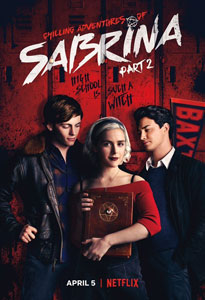On the “Buffy” fan Facebook page I frequent, “Chilling Adventures of Sabrina” (Netflix) is often mentioned when someone asks “What’s a new show that’s sort of like ‘Buffy?’ ” It’s hard to resist the comparisons. After all, the nine episodes of Season 1, Part 2 end with (spoilers follow) …
… Sabrina facing off against the Dark Lord while wearing a pretty (if more Church-of-Nighty) dress, and then having her boyfriend end up in Hell. She also rejects the Dark Lord’s advances at one point with “Sorry, I have school,” something Buffy could relate to.
Sabrina goes with the flow
But there’s a difference. Buffy is deeply affected by the bad things that happen in her life (then she gets back up and tackles the problem). Sabrina goes with the flow. Don’t get me wrong, she’s appealingly played by Kiernan Shipka, but Sabrina reacts to accidentally creating an evil doppelganger of herself the same way she’d react to failing a homework assignment. It’s all water off her back.

“Chilling Adventures of Sabrina” Season 1, Part 2 (2019)
Netflix, 9 episodes
Creator: Roberto Aguirre-Sacasa
Stars: Kiernan Shipka, Ross Lynch, Lucy Davis
(I’m just guessing about the homework thing; even though she attends both the Academy of Unseen Arts and Greendale’s Baxter High School, Sabrina is rarely seen in class or doing homework.)
With a nod to Veronica Mars and her too-cool-for-school aesthetic in the Aughts for paving the way, Sabrina – and her friends, to a lesser extent — is emblematic of this new era of stoic Gen-Z teens who haven’t exactly experienced everything, but are prepared for everything. No matter the situation, today’s teens have a tool in their psychological tool box.
Talking to Harvey (Ross Lynch) at a dance, the psychic Roz (Jaz Sinclair) comforts him by saying she knows girlfriends with magic powers are a trigger for him. I’m 90 percent sure the writers aren’t making fun of the relatively new term “trigger,” but it’s nonetheless funny, and a good example of how “Sabrina” successfully has it both ways in everything it does.
Another big late-millennial, early-Gen-Z issue is transgenderism and how society and laws should approach these recently spotlighted people, so I appreciate the portrayal of Susie/Theo (Lachlan Watson) in the same way I appreciated the portrayal of gay people at the century’s turn. It’s something TV hasn’t shown us before, and by seeing the issues Theo deals with, I understand him more, and can loosely extrapolate that to the wider transgender community. Granted, this arc is effective because Watson is good in the role more so than the story’s specifics.
Anachronistic modern times
“Sabrina” purposely takes place in modern times with anachronistic trappings, but sometimes the blend is awkward. Theo’s obstacles include 1) the fact that there’s only a boys’ basketball team at Baxter High, and 2) the bigotry displayed by every teammate against him. On the first point, there are no schools in 2019 without gender equity in athletics; it’s the law. And besides, it would’ve been more fascinating to see Theo reject the girls’ team option.

On the second point, Gen-Zers don’t tend to be bigots. So we have a 2019 transgender male facing bigotry from a 1950s boys’ basketball team. That’s a lot more incongruous than the show’s dearth of cellphones and computers, and it does a disservice to Theo’s arc by giving him a strawman opponent, thus making the victory a bit hollow. Further complicating the purity of the arc, Sabrina uses magic to make Theo a better shooter and get him a spot on the team.
Among the wider-stakes threads, it’s kind of hard to take seriously all the hand-wringing about the Dark Lord’s search for a bride, and Miss Wardwell/Lilith’s (Michelle Gomez) power plays for the throne, and Faustus’ (Richard Coyle) strategies to keep his place atop the Church of Night. But the vibe of the show is that we’re not supposed to take it 100 percent seriously. Sure, it’s more serious than, say, “Gotham,” but it’s much more winking than “Buffy” or “Harry Potter” (another touchstone, with the Academy of Unseen Arts playing as a more foreboding Hogwarts).
Similarly, as I outlined in my review of Part 1, “Sabrina” has its cake and eats it too in regard to religion. All the witches worship Satan – and all the trappings are the opposite side of the coin from God worship (“Thank Hell” instead of “Thank Heaven,” etc.) – but really this religion is the same as many others in its broad strokes. For instance, the traditions of the Church of Night prevent (or try to prevent) Sabrina from vying for positions or accolades that her male colleagues are encouraged to go for.
Part 2 deviates from the notion that this could be any stuffy old religion, though, because Sabrina – and her friends, and her relatives, and even the bad guys at the Academy — fight Satan if they don’t like his plan. Thematically, this is fairly meaty stuff, as the writers set up a conflict between freedom and power but also ask if their main character can acquire both.
Not a humble heroine
As sweet and cute and decent as Sabrina is, she’s not humble or modest. She wants power and the freedom to use it her way. I think that might be her ultimate goal for the whole series, which has been renewed through a full Season 2.
Still, what I like most about “Sabrina” is how it looks. The best melding of visuals and story points comes when Sabrina stands on the peak of her roof, holding a broom, with the full moon behind her. She aims to fly and showcase her witch powers for all the youths of Greendale – a way to show them she’s nothing to be scared of and that everyone can get along, witches and “mortals” (as witches call normal humans). That’s a high point. A low point for this batch of episodes is when Ambrose (Chance Perdomo) picks a lock on the inside of his dungeon cell in order to escape.
Part 2 includes fun casting of genre favorites – “Angel’s” Alexis Denisof, “Alien’s” Veronica Cartwright, “Twin Peaks’ ” Ray Wise and “The X-Files’ ” William B. Davis – but it also sometimes casts its supporting players in roles for the sake of plot advancement. Prudence (Tati Gabrielle), for instance, wavers on being absolutely terrible to Ambrose, happy to see him be wrongfully executed, to being his staunch ally. Too often, I can see the gears spinning with the writing of some characters.
That said, too many of them – including Sabrina’s aunts (Lucy Davis and Miranda Otto) and her Baxter High friends – are too delightful for me to dislike “Chilling Adventures of Sabrina.” The series is objectively imperfect, but always fun, and it’s kind of a shame it’s released under Netflix’s all-episodes-at-once format.
This is an ideal show for having one episode a week so we can discuss it with fellow fans – like “Buffy” in the old days and still some shows (like “Roswell, New Mexico”) today – and build up excitement for next week’s journey into this ridiculous but wonderful world.

